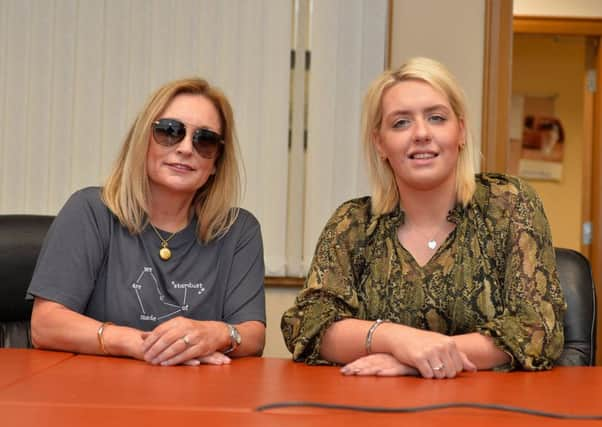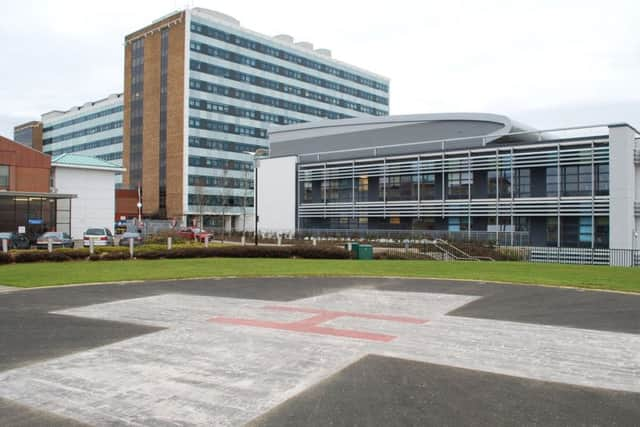Eye transplant recipient targets donation myths


Sonya MacDermott told the Journal how her own transplants have transformed her life, as she joined with Sinn Fein’s Hayleigh Fleming to look at how they could address widespread misconceptions about what is actually used from the eye of a transplant donor.
Sonya, who lives in the Northlands area, was diagnosed with a rare hereditary condition called Fuchs Dystrophy after her vision started declining rapidly in her mid 30s, although she had noticed changes several years earlier.
Advertisement
Hide AdAdvertisement
Hide Ad“It is an eye condition that runs through families and is more prevalent in women,” she said. “I knew there was an eye problem somewhere in the family genes but didn’t know it was this. By my mid-30s I started noticing a haze, like when you wake up in the morning and your eyes are hazy, but it wouldn’t clear. I went to an optician and he sent me straight to Altnagelvin and I was diagnosed. He had to look it up because it is quite rare.”


Sonya’s condition means the pumps in the cornea stop working, leading to clouding and a loss of vision. “It settled and then it got progressively worse and three and a half years ago then it got so bad in the right eye that I couldn’t see out of it,” Sonya said. “When the corneas don’t work it clouds, and mine was also like a billion grains of sand being rubbed constantly in your eye ball, it’s very painful.
“I went to the doctor again, went back to Altnagelvin and met the consultant Cian Collins and he had only started performing lasik corneal graft, and that’s a partial transplant which has a quicker healing time than a full transplant. The procedure is fairly new. I was lucky I was viable for the partial transplant.
“Within weeks I had full sight in the eye, I mean in HD sight, not even clear sight. I haven’t seen that clear in 20, maybe 30 years.”
Advertisement
Hide AdAdvertisement
Hide AdSonya said Dr Collins, his team and staff at the department in Altnagelvin were amazing. “I cannot reiterate enough how brilliant they are,” she said.
Meanwhile Sonya’s left eye had gotten progressively worse with the condition, and she put herself forward for a second transplant, undergoing surgery almost a year ago. “You have to wait obviously because of the dearth of corneas,” she said. “I understand people think, ‘I couldn’t approach somebody in the street and think they had my son or daughter’s eyes’, but it is not the actual eye, there’s so many components to the eye and they use the outer layer of the cornea, they don’t use the iris or the eye ball. So the way you wouldn’t see a kidney, you don’t see a cornea.”
“That’s what people fear and I totally understand that, but it is just the outer layer, it’s nearly like a windscreen. I would urge anybody to think about it and I would urge also maybe we could, like the south, start thinking of opting out rather than opting in.”
Sonya said the condition had been devastating for her independence and that the donors have given her a new lease of lie.
Advertisement
Hide AdAdvertisement
Hide Ad“I couldn’t drive, I had no spatial awareness. It goes bad quite rapidly. I went from being very, very independent to being dependant, I lost driving, I walked differently. When your sight goes it’s just a different world.
“To go from having no sight to having sight, Oh my God, I can’t explain it. Even to have one eye, because by that time both of my eyes were affected. Within six months I was back to driving, training in the gym and living a full life again. This was someone else who gave this and I am truly grateful for it.”
Hayleigh Fleming said recent surveys show that while over 85 per cent of people would be willing to donate their organs, only 25 per cent are registered. “Up to seven people can benefit from one organ donor so we would be urging people to sign up. You can do it online, by phone, and Facebook,” she said.
“We are looking at opt out. There is such a need for it here. Look at the way Sonya’s life has completely changed, it has come back round, and we in Sinn Fein are passionate about organ donation. After all, you are more likely to receive an organ donation than to be a donor.”
Advertisement
Hide AdAdvertisement
Hide AdSonya adds: “And also eyes fall to the bottom of it as well. There’s a massive disparity between liver, kidney, heart, lungs, everything, and then eyes.”
Ms. Fleming said it was vital misconceptions were addressed: “You speak to people and they say, ‘Anything but my eyes’, because they have this perception that the full eye is going to be taken out of your head and it is not like that. It’s not talked about enough and we will be raising awareness around that. There’s just that lack of awareness out there and I don’t think it’s just here, it’s actually global.”
People can become organ donors by registering online at www.organdonation.nhs.uk or phone 0300 123 23 23.